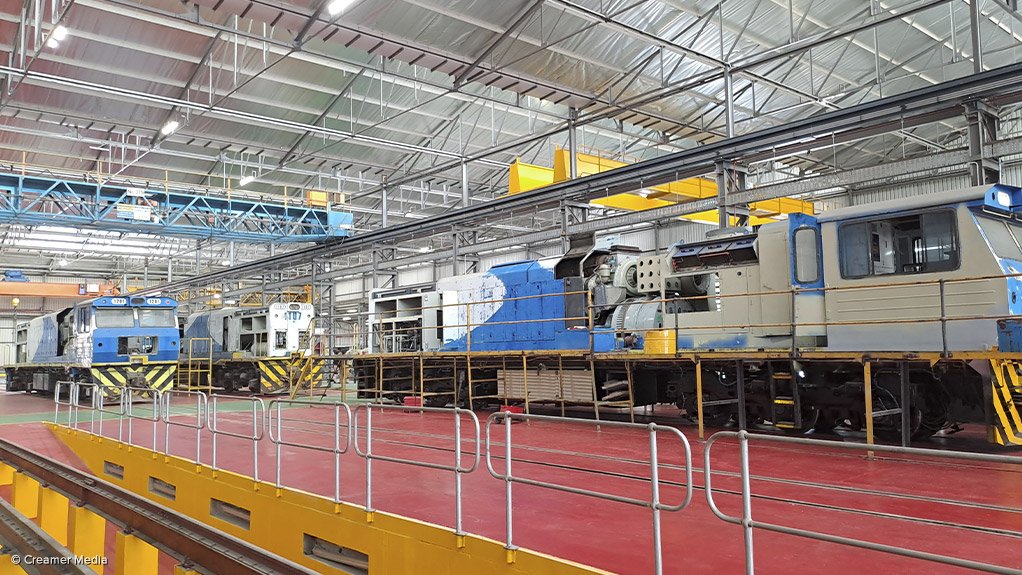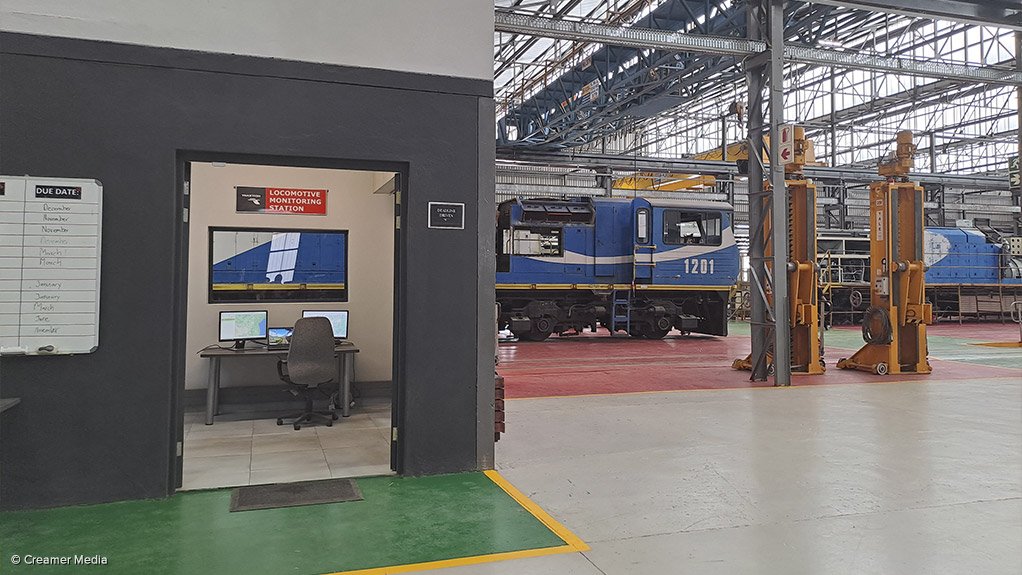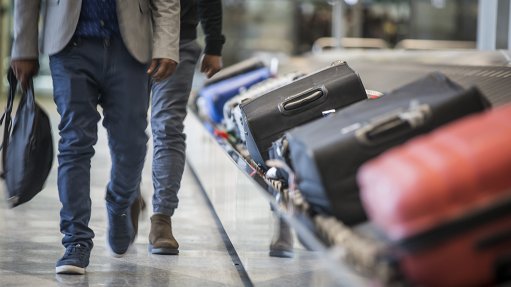Traxtion calls for open rail access in South Africa, looks to build on 35-year journey



Rosslyn Rail Services Hub
Photo by Creamer Media's Tasneem Bulbulia
Traxtion monitoring technology
Photo by Creamer Media's Tasneem Bulbulia
As it celebrates 35 years of operation, private rail operator Traxtion has called for open rail access in South Africa, to enable the company to replicate similar success and freedom it has enjoyed in other countries on the continent and to build on the growth it has achieved thus far.
Speaking at a celebration commemorating the company’s thirty-fifth birthday on October 25, Traxtion chairperson Brian Myerson said the operator had grown from small beginnings to being Africa’s largest independent rail company.
He lauded the “remarkable performance” Traxtion had achieved over the past five years, despite the difficulties it had faced in rebuilding the business.
Myerson highlighted that this included the company managing to employ and augment its team with more than 350 direct employees and 500 indirectly employed across Africa.
He also enthused that the company adhered to proper professional standards, with the highest level of corporate governance. “Traxtion is a great example of how to do business in Africa,” Myerson said.
He added that Traxtion’s ambition was matched by many countries in sub-Saharan Africa, with the company being allowed open access to their railway systems. This, he said, engendered a mutually beneficial relationship for the company and for these countries, of long-term investment in locomotives and wagons, and building of relationships.
He highlighted that this had also enabled the company to fully deploy its locomotives and wagons, with the potential to increase this further given the current demand for its services.
However, Myerson lamented that, despite being a South Africa company, Traxtion had not experienced similar open rail access in the country.
He expressed his hope that this would soon be facilitated, to allow Traxtion to grow in the country as it had in the rest of Africa, and for it to assist, in turn, with the growth of the country’s rail industry and its economy.
In this vein, Myerson urged stakeholders to work towards facilitating this.
These sentiments were echoed by Department of Transport director-general Ngwako Makaepea, who said the recently approved White Paper on the National Rail Policy would be a key enabler in engendering this, with one of its aims being to open the rail network to private sector investment and third-party access.
He emphasised that government was bullish about opening up the space for access, for both freight and passenger rail, with this posited to be a step in the right direction for the industry and the country.
He also lauded the work done by Traxtion in terms of skills development, saying government saw this as a direct contribution towards such requirements in the policy.
Makaepea also mentioned that government was keen on investment-led railways, with research indicating that these have the potential to considerably bolster the economy.
Makaepea emphasised that private sector participation was critical to the implementation of the policy, with government already engaging them to ensure this could be realised.
He added that he was looking forward to aligning Traxtion’s efforts in the industry with elements of the policy.
GROWTH TRAJECTORY
Meanwhile, Traxtion CEO James Holley said that the company had “achieved against the odds”, having had to contend with the roadblock to open access, in addition to global and local challenges.
He outlined that Traxtion’s journey began in 1987, when General Motors EMD decided to close its locomotive production and assembly facility in Port Elizabeth.
One of its staff members, the late Roy Puffett, had to decide between relocating to the US or taking a retrenchment package. He opted for the latter, and with a second-hand toolbox, bakkie and caravan and the retrenchment pay, drove around the country with the caravan doubling up as his hotel and admin office, servicing locomotives that he was once part of manufacturing and commissioning into service.
Richards Bay and Middelburg were the first stops on a route which initially created Sheltam, and then morphed into Traxtion.
In its initial years, in South Africa, Traxtion capitalised on the opportunity to acquire old, under-maintained locomotives from mines; and conducted maintenance intervention and leased this back to the former owners through a turnkey operating contract over a period of several years. This lease approach provided income stability for the young company, while also allowing the business to build and strengthen its balance sheet.
During the early 2000s, as the profile of the company started to grow, it became evident that mainline railway operations in South Africa would only be realised many years down the line. This resulted in many rail-friendly industries having to move to road logistics. This forced Traxtion to pursue growth opportunities in the rest of the continent.
These out-of-country growth opportunities became the catalysts that spurred continual company development and growth. Between 2006 and 2017, Traxtion transformed from a single-founder, family-owned company into a multinational company with substantial amounts of capital available to invest in growth projects.
In 2017, as part of the growth process, the group underwent a significant rebranding exercise which turned it into Traxtion. With its red and black livery, the company embarked on the construction of the large Rosslyn Rail Services Hub and substantial investments into locomotives and wagons.
Holly highlighted that this all led to Traxtion’s current state, of successful rail freight operations in eight African countries – Senegal, Tanzania, Zambia, Namibia, the Democratic Republic of Congo, Zimbabwe, Mozambique and South Africa.
Moreover, he noted that it boasts 55 locomotives and 250 wagons – one of the largest privately-owned mainline locomotive fleets on the continent.
As alluded to, Traxtion also has its rail services hub in Rosslyn, with a skilled team of in-house artisans and entrenched experience in maintaining, rebuilding and overhauling locomotives to original-equipment manufacturing standards.
Holly also indicated that it had the equivalent of a National Occupational Safety Association 5-star safety rating; and was Rail Safety Regulator-accredited and ISO9001 certified.
Further, Traxtion has a Transport Education Training Authority and Quality Council for Trades and Occupations-accredited rail school that has trained more than 75 ‘red-seal’ locomotive artisans, 700 drivers and many other complementary trades.
Now, Holley said, the company was looking to build on this and was investing significantly in technology, maintenance systems, operational systems, train risk mitigation system, procurement and people.
“We are doing this because we are optimistic about what the future of South Africa and the rest of Africa can pose,” he enthused.
Article Enquiry
Email Article
Save Article
Feedback
To advertise email advertising@creamermedia.co.za or click here
Comments
Press Office
Announcements
What's On
Subscribe to improve your user experience...
Option 1 (equivalent of R125 a month):
Receive a weekly copy of Creamer Media's Engineering News & Mining Weekly magazine
(print copy for those in South Africa and e-magazine for those outside of South Africa)
Receive daily email newsletters
Access to full search results
Access archive of magazine back copies
Access to Projects in Progress
Access to ONE Research Report of your choice in PDF format
Option 2 (equivalent of R375 a month):
All benefits from Option 1
PLUS
Access to Creamer Media's Research Channel Africa for ALL Research Reports, in PDF format, on various industrial and mining sectors
including Electricity; Water; Energy Transition; Hydrogen; Roads, Rail and Ports; Coal; Gold; Platinum; Battery Metals; etc.
Already a subscriber?
Forgotten your password?
Receive weekly copy of Creamer Media's Engineering News & Mining Weekly magazine (print copy for those in South Africa and e-magazine for those outside of South Africa)
➕
Recieve daily email newsletters
➕
Access to full search results
➕
Access archive of magazine back copies
➕
Access to Projects in Progress
➕
Access to ONE Research Report of your choice in PDF format
RESEARCH CHANNEL AFRICA
R4500 (equivalent of R375 a month)
SUBSCRIBEAll benefits from Option 1
➕
Access to Creamer Media's Research Channel Africa for ALL Research Reports on various industrial and mining sectors, in PDF format, including on:
Electricity
➕
Water
➕
Energy Transition
➕
Hydrogen
➕
Roads, Rail and Ports
➕
Coal
➕
Gold
➕
Platinum
➕
Battery Metals
➕
etc.
Receive all benefits from Option 1 or Option 2 delivered to numerous people at your company
➕
Multiple User names and Passwords for simultaneous log-ins
➕
Intranet integration access to all in your organisation




















